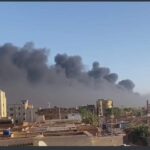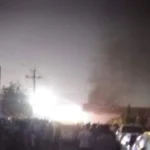Repot by: Darfur follow-ups
More than 200 days after the outbreak of fighting, Sudan is witnessing a severe humanitarian crisis and civilians are paying the price of the ongoing fighting.
The United Nations Office for Humanitarian Affairs (OSHA) said that about half of the population – 24.7 million people, including 14 million children – need humanitarian aid. And assistance in the field of protection.
Most of the displaced are women and children
In a report marking the 200th day of the war, OSHA indicated that about 5.8 million people have been displaced inside Sudan or have fled to neighboring countries, half of whom are children, and women constitute 69 percent of the displaced. Data from Chad indicate that 90 percent of the refugees who cross The borders are women and girls.
Likewise in Egypt, the United Nations High Commissioner for Refugees recorded that most of the families registered crossing the border were headed by women, and the conflict – and increasing hunger, disease and displacement – threatens to further deteriorate the situation. It is time to silence the guns.
A step away from starvation
The report confirms that millions of people – especially in Khartoum, Darfur and Kordofan – lack food, water, shelter, electricity, education, health care and nutrition.
As the humanitarian situation deteriorates, the ability of local communities to adapt has weakened.
Hunger and malnutrition were already at record levels before the fighting, and now, an estimated 20.3 million people – 42 percent of the population – face acute food insecurity. Of these, 6.3 million people live at emergency levels of hunger, just one step away from famine.
More than 18 million people lack access to improved sanitation and nearly 8 million people practice open defecation. About 3.5 million children under the age of five suffer from acute malnutrition, of whom 700,000 suffer from severe acute malnutrition and are 11 times more likely to die than their healthy peers.
This increases the burden of care on women and girls and exposes them to multiple risks in the context of armed conflict.
A call for respect for international humanitarian law
OSHA called on the parties to the conflict to put an end to harm to civilians and respect international humanitarian law, as agreed upon under the Jeddah Declaration of Commitment to Protect Civilians in Sudan.
The report added: “The parties must allow civilians safe passage. People fleeing the conflict – especially women, children and people with special needs – must be “Attacks on hospitals, schools and other civilian infrastructure must stop, access to vital materials and services must be ensured, and all health facilities occupied by parties to the conflict must be evacuated.
De-escalation, dialogue and cessation of hostilities are essential to resolving the crisis.”
A threat to the harvest season
The United Nations Office for Humanitarian Affairs (OSHA) said that the spread and escalation of the fighting raises grave concerns, especially with the conflict reaching new areas and hostilities have begun to extend to Al-Jazira State, which could have serious consequences on the harvest season and agricultural productivity. The report stressed that the shortage of vital inputs such as seeds and fertilizers, in addition to erratic weather patterns, threatens agriculture and harvest. It warned that a below-average decline in the coming months could push more people into hunger and others into more severe levels of hunger.
Rape as a weapon of war
OSHA confirmed the increasing number of reports of sexual and gender-based violence, enforced disappearances, arbitrary detention, and gross violations of human and children’s rights. She called on the parties to the conflict not to use rape as a weapon of war, and that those accused of it should be held accountable. She stressed that as tensions escalate, the ability to access protection services and support systems decreases. Civilians are exposed to explosive hazards.
The largest displacement crisis in the world
The war in Sudan has led to the largest displacement crisis in the world, with more refugees fleeing across Sudan’s borders, and OSHA warned of a humanitarian catastrophe if the war continues.
Humanitarian partners are working closely with governments in neighboring countries to respond and said the new arrivals need protection and assistance. Host communities in remote border areas also suffer from a lack of infrastructure and services and food scarcity.
Moreover, host communities in remote border areas, where services and infrastructure are scarce or non-existent, are already suffering due to climate shocks and food scarcity.
Warning of the death of 10,000 children
The report confirmed outbreaks of cholera, dengue fever, measles and malaria in large parts of Sudan, even in relatively safe sites hosting displaced populations. She said that floods inundating IDP sites increased the risk of the spread of deadly diseases. It called on partners to urgently contain the ongoing disease outbreak and mitigate the risks of potential outbreaks.
She pointed to projections based on modeling from Johns Hopkins’ Save Lives Tool that at least 10,000 children under the age of five may die by the end of 2023 due to increased food insecurity and disruption of basic services.
19 million children are waiting for schools to open
OSHA said that about 19 million children are waiting for schools to reopen and stressed the right of children to education and the role of schools in protecting children from the physical dangers surrounding them – including abuse, exploitation and recruitment into armed groups. It warned of devastating effects on children’s development if the conflict leads to Schools are closed.
Obstacles to humanitarian action
OSHA said humanitarian workers continue to face enormous obstacles, demanding the removal of barriers so aid workers can move supplies more quickly. It also confirmed that visas, travel permits, and other procedures required to transport employees and assistance within the country delay the delivery of assistance.
Looting and attacks against humanitarian workers, facilities and supplies also undermine the ability of partners to provide aid and services.
The report called on the parties to the conflict to adhere to international humanitarian law and to ensure unimpeded access for humanitarian workers and supplies.
Aid convoys face threats, roadblocks, restrictions and bureaucratic obstacles, while intense air strikes and bombing in Khartoum make safe access almost impossible








